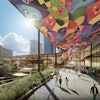As we welcome in 2018, new trends will shape the events and meetings industry. The good news is all signs point to another banner year. While societal movements and technology advancements may raise some concerns, this people-first industry remains at the forefront of where marketing, wellness and hospitality are going.
1. Consolidation Is King
Organizations will continue to streamline operations so that travel, meetings and event programming will fall under one roof. The Global Business Travel Association reports 64 percent of meetings, events and/or travel programs are either fully consolidated or in the process of consolidating. Benefits include transparency, increasing efficiency and decreasing costs.
2. Anti-Tourism Is Mounting
One outgrowth of the
growing nationalism movement in this country is tourism is being targeted. This is manifesting itself in challenges to
Uber and Airbnb, reports IMEX. But with challenges come opportunities. Says
Carina Bauer, CEO of the IMEX Group: “The industry must continue to strongly communicate the short and long-term benefits that meetings, events and incentive travel bring to a destination—both in terms of the high impact direct benefits as well as longer-term indirect benefits associated with the development of knowledge and innovation economies.”
3. Women Will Keep Moving Up
The events industry is primarily comprised of women—except when it’s not. Namely, C-level positions remain elusive and some sectors remaining slow to integration. But with the #MeToo movement exposing bad behavior among male executives, there will be more room for women to grow. Organizations are stepping to the forefront to assist. Connect has hosted two “
Women in Sports Tourism” forums; IMEX is launching a “She Means Business” conference in Frankfurt, Germany, in 2018; and event tech entrepreneurs Leonora Valvo and Marie-Claire Andrews have launched
womenineventtech.org to serve women often overlooked in technology-related fields and events.
4. Business Won’t Slow Down
A new report from Financial & Insurance Conference Professionals shows 89 percent of suppliers expect business to increase or remain the same based on the frequency and rates of RFP submissions.
5. The Chinese Are Coming
WeChat reports stats finding Chinese travelers are choosing the U.S. over more countries. To translate that into more business, hotels are employing WeChat, a social media app to target more than 120 million potential guests.
6. Events Will Be in Retreat Mode
Kindred Hotels predicts conferences will feel more like retreats than traditional meetings. The company says planners will include longer breaks and more free time in the schedule to allow attendees to soak in their experience and surroundings.
Local Measure, a location-based customer intelligence platform concentrating on tourism and hospitality, says the trend extends to wellness. It predicts Pilates will give way to silent retreats as the first wave of wellness gives way to new opportunities.
7. More Breaths of Fresh Air
Coffee breaks aren’t going away, but Kindred says it will have some competition. It’s planning on activities like forest bathing, archery, animal interactions, nutritional workshops, meditation sessions, various types of yoga and oxygen breaks will gain in popularity.
8. Marketing Is Going in-House
A new Association of National Advertisers report finds 35 percent of respondents have increased their media buying capabilities. That’s a significant rise from last year. It’s also not great news for agencies used to handling promotional material for CVBs.
9. Robots Are Arriving
Two Sheratons in the Los Angeles area are scheduled to start employing service robots in 2018. Among their tasks: handling luggage and guiding attendees to meeting space throughout hotels.
10. AR as a Wayfinding Tool
If robots aren’t showing you and your attendees around, augmented reality maybe doing it. Because GPS doesn’t work indoors, the industry has struggled with giving directions inside mammoth convention centers and hotels. Noted industry analyst Corbin Ball says Google took a big step forward recently, announcing its Tango Visual Positioning Service at the Google I/O developer conference. The whole point of the technology is to offer hyper-local directions indoors. Apple’s new iOS 11 and iPhone X also rely heavily on AR. Forget getting to ballrooms—we could be looking at step-by-step directions to booths, displays, signs and banners. And that’s to say nothing of scavenger hunts.
11. Combined Catering
The co-working phenomenon will make its way to hotels in the form of shared buffet-style meals for multiple groups staying on-site, predicts
hotelmanagement.com. It should cut down on expenses, potentially opening the door for notoriously cost-conscious groups like start-up and millennial-heavy companies to stay at hotels.
12. Hotels Will Work Smarter
Ball notes hotels handle most events the same, regardless of size. That means assigning a salesperson even through a large portion of meetings and conducting thorough negotiations. But as a growing number of meetings will be for 50-or-fewer people, Ball says properties will turn to booking meeting space online to save time, energy and cost for all parties.
13. Apps Will Be Simpler for Attendees and More Complicated for Planners
Kerry J. Plowman, former president-elect of the BC Chapter of the American Marketing Association who’s overseen more than 30 events per year, has good news and bad news. Attendees’ lives will be easier as planners craft events as experiences geared toward one goal (think networking, education or promotion) instead of viewing meetings in a chronological fashion. When done correctly through the personification of apps and marketing, this will appear seamless to guests. Of course, it takes a lot of work for planners to make it look easy. More tech staff will be needed to merge digital and physical planning and execution.
14. Planners Are Getting Smarter
Michael Balyasny, CEO and founder of
Attendify—a DIY event app—says planners are catching up to technology. How does he know? “They are asking the right questions,” Balyasny says. Namely, planners understand they need to use big data to do their jobs effectively. “It is opening meeting planners’ eyes on the possibilities of true personalization, in terms of experience and marketing.”
15. Campaigns Will Really Go Digital
Traditional revenue streams like sponsorships and advertising will take different forms. “Event organizers will begin implementing more digital revenue opportunities, from online banner ads to content sponsorships to hybrid events,” says Michelle Bruno, author of Fork in the Road Blog and Event Tech Brief. And as planners and suppliers study attendance and engagement data more, look for more paid digital campaigns through Facebook and Twitter, predicts Balyasny.
16. Late Night Treats
Monika Lotter, director of catering and conference planning at Trump Hotel Chicago, says night owls are eating up some of her offerings. “When we pass or place the mini sliders and french fries on a station at that 11:30 p.m. hour, the crowds form,” she says.
17. Bread Baking as Teambuilding
A teambuilding activity that’s seen a rise—pun intended—in popularity is bread baking. Craddock Terry Hotel in Lynchburg, Virginia; The Restoration in Charleston, South Carolina; and The Ritz Carlton, Sarasota in Florida are three hotels that have cooked up baking experiences either in-house or by partnering with local establishments.
18. Advantage Humans (for Now)
Artificial intelligence is likely going to mean fewer jobs and humans working fewer hours (making less money) in the future. Louise Brownhill, chief learning officer at PwC, estimates one-third of jobs will be gone due to AI in five years. The events industry should be insulated, though. Says IMEX’s Bauer: “This is, as often said, ‘a people industry’ and while we promote and support technology, we must take note of these trends, and look after our people, their health, their safety, their sense of fulfillment and their futures.” AI may have a voice, but not that personal touch (yet).















